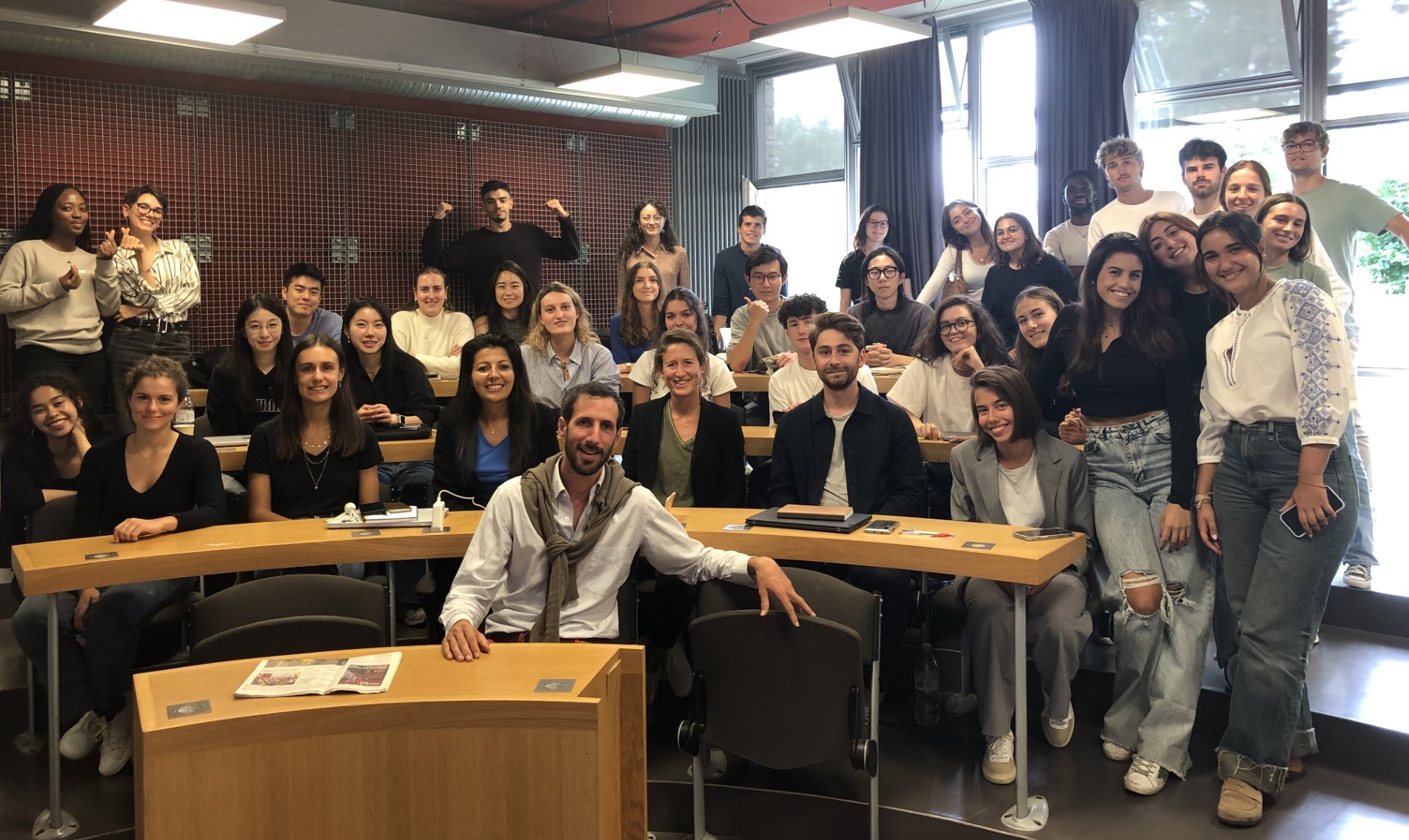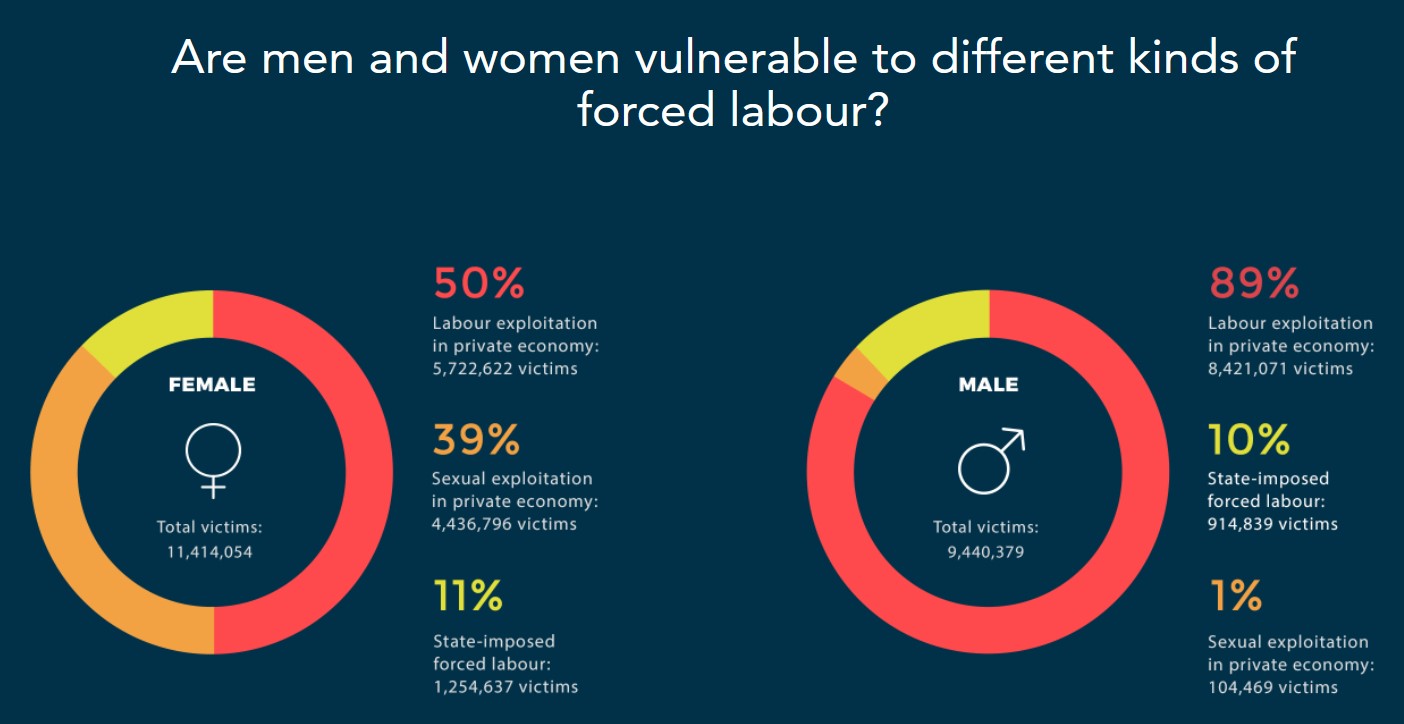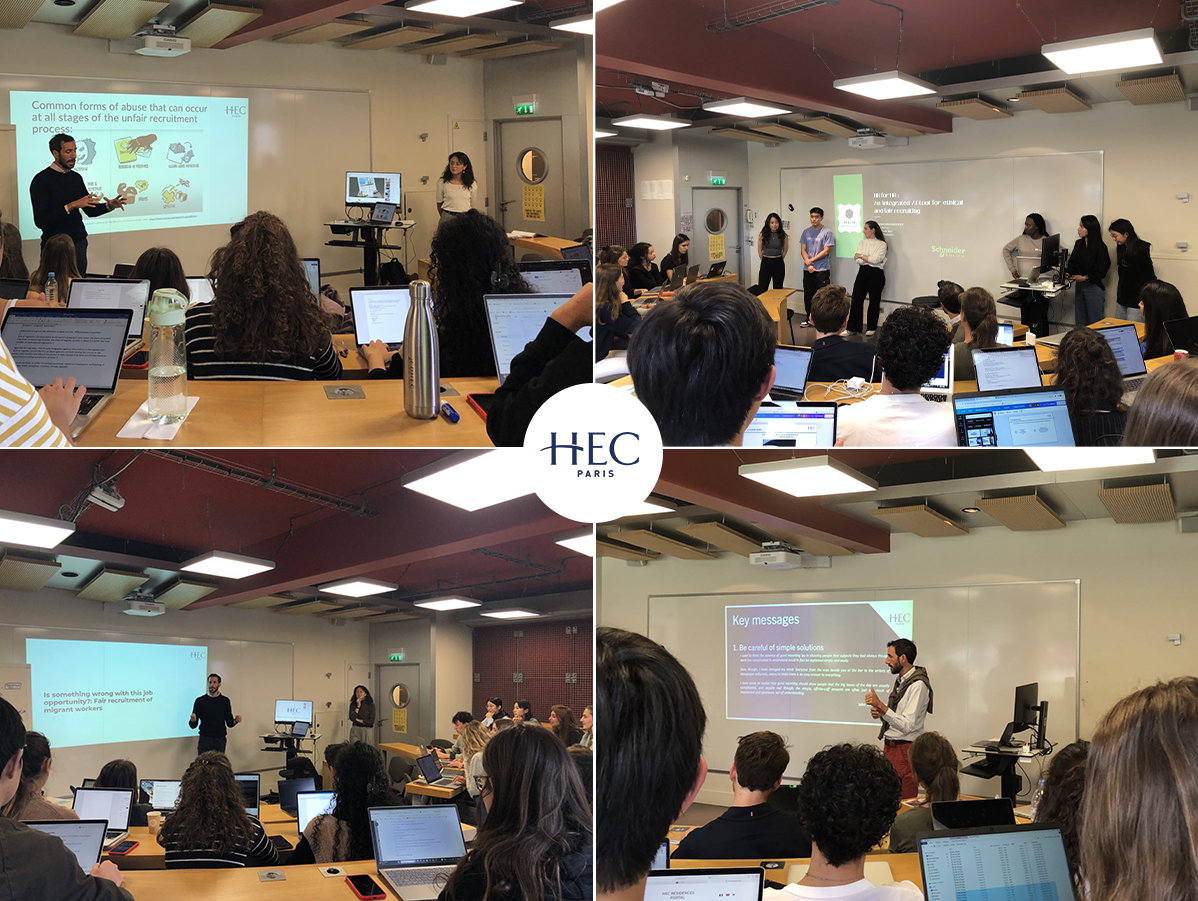“Is something wrong with this job opportunity?”: HEC Paris challenges student’s minds for fair labour practices
With a new two-day challenge led by Charles Autheman, Business and Human Rights expert and lecturer at HEC Paris, M1 students who just entered their second year on Campus are introduced to major issues across strategic management, human resources, international law, and ethics. On September 1st and 2nd, 2023 and in front of professionals from three French multinationals, a 40-student-cohort was confronted to one of the most pressing contemporary economic and human rights’ challenge: unfair recruitment practices.
Auteur/Author of this article: Frédéric Voirin
“HEC Students have now the opportunity to take a deep dive into some of the most pressing human and labour rights challenges and discuss how to reconcile business imperatives and respect of fundamental rights at work”. With these words Charles Autheman, HEC lecturer and consultant for the International Labour Organization, sums up his new Business and Human Rights (BHR) challenge named “is something wrong with this job opportunity?” that aims to raise awareness amongst HEC students on fair recruitment.
The objectives objectives of this 2-day awareness session are to help students be acquainted with labour migration, better understand issues related to recruitment and be able to collectively identify how business can actively participate in ensuring the fair recruitment of workers, especially migrant workers.
After launching the HEC imagine program in 2022, using peace to transform business and aiming at supporting students from war-torn countries, HEC Paris keeps revisiting business practices with this 2-day challenge. HEC students are asked to think about the recruitment differently, with a specific focus on the vulnerabilities of migrant workers and the expertise of high-quality HR-professionals.
A 2-day challenge to think about business differently
A very international cohort of 40 HEC M1 students (second year) participated in this activity, scheduled on their very first days on campus and before they officially start classes for the new academic year. It is meant to help them work on concrete business situations but also engage in team work, some students arriving for the first time in the school while others are returning after a first year on campus.
The first question asked to the students was to know who identifies as a “migrant”. Though many students came from countries other than France (Spain, Italy, Morocco, Lebanon, Ivory Coast, Guinea or China), none of the students identified as “migrants”. Ensued a passionate discussion around migration, forced and voluntary displacement, and the main characteristics of labour migration.
Autheman detailed some of the teaching specificities of his new course at HEC Paris. “We are looking with the students at the issues of mobility: how workers migrate across the globe, how they are recruited in their country of origin to work in a country of destination”. The BHR expert clarified concepts with simple but direct explanations: “recruitment of migrant workers can work quite well, that’s what we call fair recruitment; but it can also happen to work unfairly and this can lead to labor abuse. So, we try to understand the whole process, and what businesses can do to avoid and remedy this unfair situations for (migrant) workers”. According to Autheman, introducing these business and human rights issues in management education is rather new: “a lot of initiatives are taken to tackle labour abuse in the workplace but it’s rather rare to see pedagogic actions like this challenge within business schools. We need to (re)educate the future business professionals, and it’s a great chance to have such diverse student populations now at HEC to do so!”.
"Many of us are actually migrants"
A new approach focusing on the vulnerabilities of migrant workers
Autheman co-facilitated the challenge with Lucy Siers, research assistant at the NYU Stern Center for Business and Human Rights using a teaching resource he co-designed with lecturers from other business schools in the framework of a partnership between the International Labour Organization (ILO) and the business school community.
He also hosted several guest speakers to help students grapple with the key concepts. Eliza Marks of the ILO joined remotely to inform students about key trends related to labour migration and the heightened vulnerability of migrant workers to forced labour. Students embarked on a participatory exercise to identify indicators of forced labour, correctly spotting situations such as deception, debt bondage or the retention of identity documents.
The lecturers informed students on the growing number of forced labour victims and shared the data from the latest estimates on the matter. According to the International Labour Organization, nearly 30 million people are trapped in forced labour around the world. The majority of these victims is found in the private sector (see graphics below) and migrant workers are three times more at risk than non-migrant workers of finding themselves in forced labour.
“Nearly 30 million people are trapped in forced labour around the world”
Unfair recruitment and the payment of recruitment fees or associated costs can lead to these dramatic situations of forced labour. To illustrate how much it can cost a migrant worker to get a job, Autheman shows a receipt of a private employment agency that helps people get recruited against the payment of recruitment fees. The lecturer explains “many people migrate to flee poverty and often, need to borrow money to access jobs. Some workers find themselves in a vicious circle of debt bondage”. To illustrate this situation, he shows recent reports documenting the debt bondage of Filipino workers or how students in Malaysia end up being trafficked into labour exploitation.
With these examples, students understand that forced labour can take many different forms. Victims are often tricked into jobs where they are paid little and then cannot leave because they have been manipulated into debt or had their identity documents confiscated. Poverty, illiteracy, discrimination, and migration are some of the factors that make workers more vulnerable to forced labour.
Students propose concrete solutions to challenges presented by company experts
In this challenge, students explore the intricacies of recruitment practices with a special focus on the vulnerabilities of migrant workers. In parallel of the lectures and discussions in class, they are divided in groups of 6 to teamwork and devise concrete strategies that businesses can implement to prevent, mitigate, or remedy unfair recruitment practices. Three guest speakers who have faced specific challenges within their respective companies share with the students the real-life scenarios they have encountered or are currently facing. On the second day, students are asked to solve these challenges and pitch their specific recommendations, based on the fresh knowledge acquired during this course, to the panel of speakers that presented the challenges one day before.
At the end of the challenge, the guest speakers sat on a "jury" to discuss the pitches submitted by the students on each business cases: Henriette Mc Cool, Social Innovation & Human Rights Manager at Vinci, Karima Cherifi, HR and internal communication VP for Americas, Middle East and Africa at Nexans (assisted remotely by her colleague Nervana Taha, HR and administration director for Nexans in the GCC), and Mathias Brachet, Human Rights Project Manager at Schneider Electric.
According to Autheman, “the fun part of this activity was that students had to solve concrete business situations (related to the recruitment of migrant workers) that the guest speakers had actually faced. They then had to pitch their solutions to the speakers and eventually got to learn what actually happened in each company.”
“Students must solve concrete business situations related to the recruitment of migrant workers”
The three guest speakers handle issues related to migrant workers and recruitment on a regular basis and are trying to address the challenges their companies are facing. More specifically, the challenges focused on redesigning the relationship with recruitment agencies for Vinci operations in Qatar, setting up joint committees between employers and workers in Nexans and drafting internal guidance on the recruitment of migrant workers for human resources staff within Schneider Electric.
To conclude this 2-day course, the lecturers and guest speakers shared pieces of advice to the participants. All of them collectively reminded the students to not forget behind the figures there are actual lives, the lives of workers, their families, and communities. Speakers also highlighted how some of the solutions are quite simple and do not necessarily require fancy tech apps or costly developments. These simple solutions are as much a practical answer to the reality as a necessity, given that many human rights professionals within multinationals are operating within small teams with limited budget.
Charles Autheman concludes the course with some final advice: “Be careful of simple solutions. Manage your emotions. Challenge the status quo. Connect with your peers. Educate yourself and others.”
“Be careful of simple solutions”
With the positive feedbacks from the students and their large smiles, this challenge illustrate what Charles Autheman said a few months earlier, during the 2023 ChangeNow summit: "HEC is building bridges between engaged programs and its education courses”. This new challenge helps indeed raise awareness of students on pressing labour issues and give them concrete tools to take future decisions in the workplace. Time will tell how students implement what they have learned and, hopefully, participate in making labour migration a positive force for businesses and workers alike.


